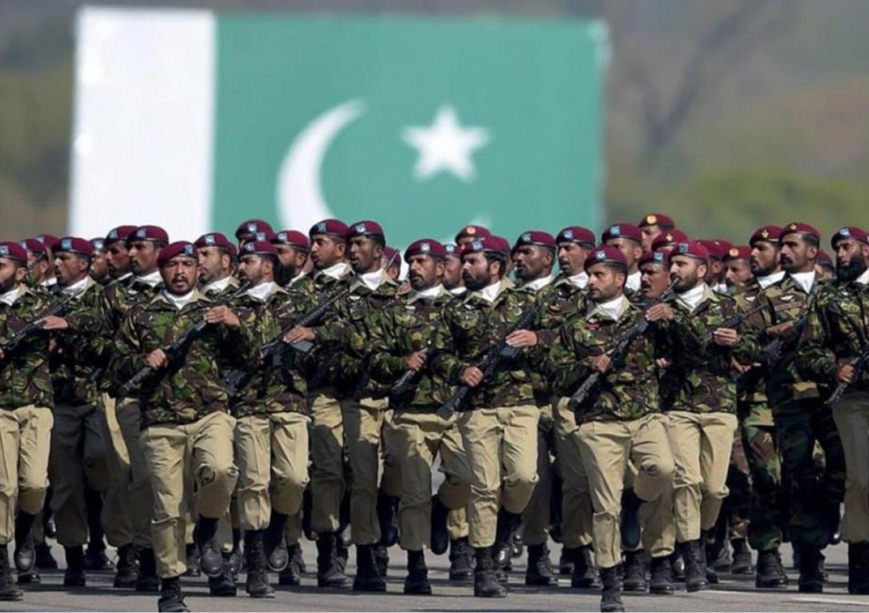
In Pakistan, the Army is often placed on the pedestal since it is the unifying factor in a fractious landscape. Politicians like Zulfikar Ali Bhutto, Benazir Bhutto, and Nawaz Sharif—the three-time Prime Minister—who tried to roll over the behemoth either paid a dear price or made a compromise. However, Imran Khan thought he was different and could turn the sails against the Army once he assumed power.
The situation became charged in the aftermath of the Panama Leaks in 2016 and the ouster of Nawaz Sharif from power, as he was again at odds with the Establishment in yet another bid to assert his constitutional authority. He called for “vote ko izzat do” (respect the mandate) and obliquely referred to interference by “khalayee makhlooq” (invisible hands or the Boys) without taking names for fear of the militarised politics.
Earlier, just before General Qamar Javed Bajwa took over as Chief of Army Staff in November 2016, there was a social media campaign highlighting that there were Ahmadiya links in his family, just as the stories alleging that the next Army Chief General Asim Munir was a Shia—his wife Irum is. The aim was to undermine the tenures of the two Army men. The effort failed to queer the pitch as the two emerged stronger with the Establishment corralling the wagons and rallying behind their leaders.
The hybrid experiment of placing Imran Khan on the Prime Minister’s chair in August 2018 under the watch of General Bajwa soon unravelled, given the egocentric and eccentric approach to all things related to governance by the new PM.
The hybrid experiment of placing Imran Khan on the Prime Minister’s chair in August 2018 under the watch of General Bajwa soon unravelled, given the egocentric and eccentric approach to all things related to governance by the new PM. The “on the same page” rhetoric soon fell apart with Imran Khan trying to assert his power and interfere in the inner workings of the Army, thereby crossing a real red line. Ironically, it was Imran Khan who had given General Bajwa a three-year extension in 2019 as Army Chief, but the two developed unbridgeable differences pushing the Establishment towards removing yet another PM from office but through the constitutional means of a no-confidence motion as governance and the economy spiralled south.
In the wake of the no-confidence motion in April 2022, Imran Khan took his so-called popularity on social media rather seriously and erroneously believed that he could take on the Establishment and yet be unscathed. He became more aggressive in his attacks on the Establishment, challenged the security and foreign policy approaches to India, Afghanistan, and the United States (US) and openly named Generals working against him—a taboo thus far. In his desperate bid to hang on to power, he called the Generals ‘Mir Jafer and Mir Qasims’ or traitors and urged the soldiers to overthrow them. He went beyond the pale in his attacks on the Army and even accused the US of working in tandem with the Establishment to oust him; crossing the red lines yet again.
In the meanwhile, following the retirement of General Bajwa, General Asim Munir was appointed the Chief of Army Staff in November 2022, with whom Imran Khan had a history. Lt. General Muni was appointed Director General of ISI in Oct. 2018 by General Bajwa. However, within a short period of eight months, he was removed on the insistence of Imran Khan allegedly for exposing “Pinki Peerni’s” (Imran’s spouse Bushra Bibi) corruption and also because he wanted Lt. General Faiz Hameed as his points man in the ISI. At that point, the relations between Imran Khan and General Bajwa were still cordial and Imran’s wish was acquiesced to.
In the face of Imran Khan’s onslaught, General Munir, to the surprise of most, displayed forbearance leading some to describe him as weak and indecisive. It can now be said that he was merely biding his time and giving enough rope to Imran to hang himself with. Munir’s opportunity came on 9 May 2023, when in the wake of Imran’s arrest his rag-tag followers attacked the Army and its installations and properties directly across the country, including the General Head Quarters (GHQ) in Rawalpindi and the Corps Commanders House in Lahore, among others. This was the cue Munir had been waiting for patiently. The Establishment’s reaction was swift and hard-hitting. Hundreds were arrested, including Pakistan Tehreek-e-Insaaf (PTI) party leaders, to be tried by military courts.
The pervasive role of the Army was further strengthened with the Parliament passing the bill amending the Army Act 1952 which permits action against anyone disclosing sensitive information about the security of the country or the Army under the Official Secrets Acts.
To date, Imran continues to be in jail, though he has received some concessions from the judiciary, belying his belief that anger against his handling would spill onto the streets forcing the Establishment to tread carefully. The absence of street leadership deflated the challenge. The PTI has been virtually decimated with leaders either incarcerated or leaving the party for fear of reprisals by the “invisible hands”. Asim Munir is firmly in the saddle and has entrenched himself deeper proving harder to persuade. His ‘no immediate response’ approach only made Imran believe that he was invincible and could take on the guardians of the nation, little realising that it was a strategy to undo him. The pervasive role of the Army was further strengthened with the Parliament passing the bill amending the Army Act 1952 which permits action against anyone disclosing sensitive information about the security of the country or the Army under the Official Secrets Acts.
This bill further tightened the noose around the PTI. Munir’s action against officers in the Army involved in politics and the 9 May mayhem is testimony to his being in command. He, like earlier army chiefs, has promoted officers he trusts and also placed his cohorts in vital positions in the Army. He continues to interact with stakeholders in the country’s political and socio-economic edifice and foreign dignitaries continue to drop by the GHQ. He has paid official visits to several major countries including Saudi Arabia, the United Arab Emirates (UAE), Türkiye, Iran, Central Asia, and the US, among others; assuring friends and allies alike. The swift reaction in response to the Iranian air incursion in Balochistan by Islamabad points to a Chief in control and the fact that there are no major schisms within the Establishment to undo the command vertical.
In an expected turn of events Nawaz Sharif was finally allowed to return to Pakistan from self-imposed exile in the UK. This was a brokered arrangement where Nawaz Sharif has been told not to repeat his old mistakes. His speech and the crowds at the Minar-e-Pakistan in Lahore would not have been possible without the Army’s nod. His address at Lahore was tepid and did not indicate how the PML-N would ameliorate the pressing economic crisis facing the country; though he did aver that good relations with neighbours, including India, was a prerequisite for development and growth.
The swift reaction in response to the Iranian air incursion in Balochistan by Islamabad points to a Chief in control and the fact that there are no major schisms within the Establishment to undo the command vertical.
Nawaz’s return also underlines the fact that issue that the Army in Pakistan has no answers to the myriad challenges posed by the economic crisis, the TTP security nightmare (a 57-percent surge in violence in 2023), sectarian conflict, Baloch sub-nationalism, the uneasy situation in Gilgit Baltistan (GB)—which is simmering politically for more than four weeks now, and Pak Occupied Kashmir (PoK), vitiated relations with immediate neighbours or the unwillingness of the Sindhis, Baloch, and Pashtoons to be subjugated by Punjabi chauvinism. The Army will continue to exercise the controlled democracy option and rotate the discredited and easily manipulated polity, reinforcing its pole position.
In the above scenario the national and provincial elections are likely to be held on 8 February, barring a major security incident, wherein no political party will secure a majority nor will the alleged popularity of Imran Khan translate into votes, though to give the façade of participative politics the PTI will win few seats. The PML-N will likely be the largest party but possibly lack the heft to form a government on its own. A coalition government will likely emerge with a combination of the Balochistan Awami Party (BAP), Muttahida Qaumi Movement (MQM), the rump PTI Parliamentarians, Istekham-e-Pakistan and Independents as the king-makers. Nawaz does not seem keen to join forces to form a government with the PPP in Islamabad. The PPP will likely retain Sindh and hopes to get a working majority in Balochistan with the support of BAP. In Khyber Pakhtunkhwa, Maulana Fazl ur Rehman and Pervez Khattak will be contenders for power. In Punjab, there is a quandary about whether the Establishment will allow the PML-N to hold sway both in Islamabad and Lahore. In the PML-N, Nawaz would like Maryam Nawaz in the post of Chief Minister but Shahbaz Sharif has discreetly thrown his hat in the ring. However, Shahbaz is more trusted by the Establishment and could be part of the PML-led government at the federal level. With the conviction of Imran Khan in the Toshakhana and the Cipher cases and his and Bushra Bibi’s expected conviction in the Al Qadir case as well the PTI voter has been given the message that Imran is not going out of jail for quite some time. The PTI could get a score or more seats in the new parliament.
In Khyber Pakhtunkhwa, Maulana Fazl ur Rehman and Pervez Khattak will be contenders for power. In Punjab, there is a quandary about whether the Establishment will allow the PML-N to hold sway both in Islamabad and Lahore.
In the immediate future, there is no likelihood of a new political leadership emerging in Pakistan which has a new approach and narrative. The return of Nawaz does not signal political or the political will to undertake deep reforms needed for economic stability. Nonetheless, despite the attacks on its credibility, the Army remains the only institution that still inspires a sense of loyalty within the populace. The Establishment is the unyielding constant reality on the ground that propels the country forward, albeit with poor outcomes.
Pakistan’s neighbours in South Asia would have to accept this and deal with it till another new and legitimate power equation emerges in Pakistan in the medium-long term. In the immediate future, Pakistan’s foreign and security policies under General Asim Munir are unlikely to witness any major shift. The India-Pakistan conundrum will continue and General Munir may prove to be more intractable than his predecessor. Whether the Bajwa doctrine will continue is not certain though Islamabad’s options in Jammu and Kashmir remain on the table. Soon, India too will slip into election mode and the new government in Islamabad would not be inclined to launch any policy initiative, even if Nawaz was to become Prime Minister anytime soon.
Rajiv Sinha is a Distinguished Fellow at the Observer Research Foundation
The views expressed above belong to the author(s). ORF research and analyses now available on Telegram! Click here to access our curated content — blogs, longforms and interviews.




 PREV
PREV


